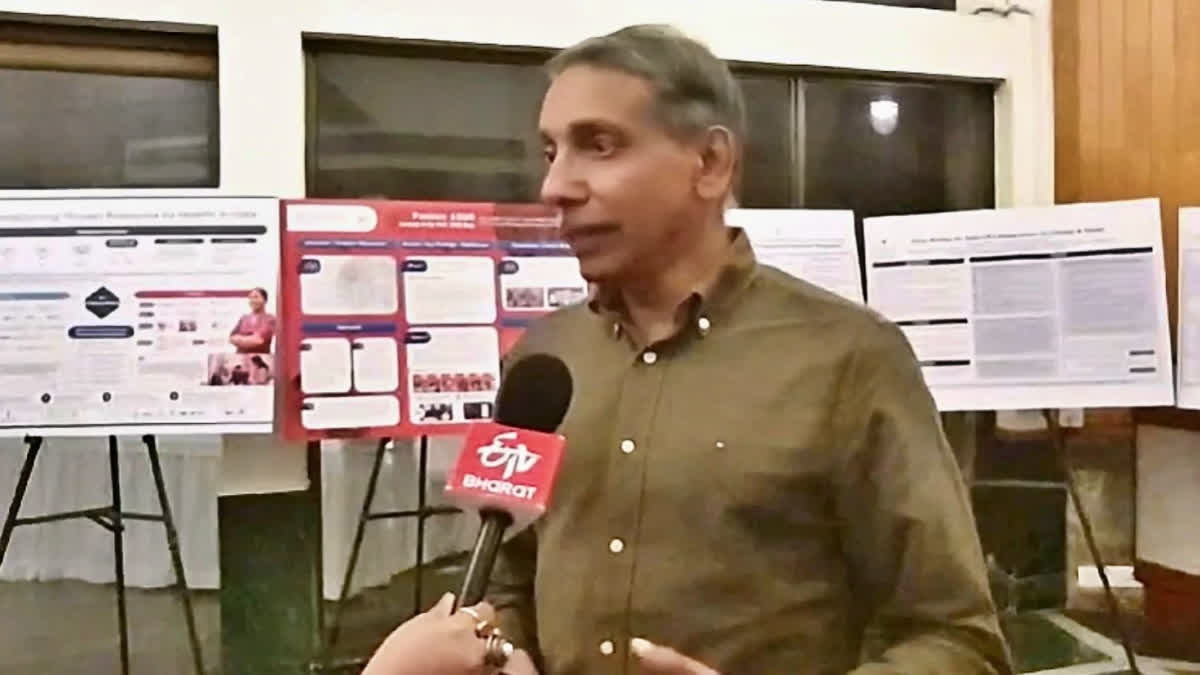New Delhi: Prof. M. Jagadesh Kumar, Chairman of the University Grants Commission (UGC) and a distinguished professor of Electrical Engineering at IIT Delhi, has outlined a dynamic roadmap to revolutionize India’s higher education landscape.
In an exclusive interview with ETV Bharat, Prof. Kumar elaborated on the critical role of international collaborations, regulatory reforms, and experiential learning initiatives in shaping the future of Indian academia.
Strengthening Global Collaborations
Prof. Kumar highlighted the significance of India’s long-standing research partnerships with global institutions, emphasizing emerging fields such as climate science, data science, biotechnology, and healthcare. He noted that these collaborations are vital for developing cost-effective and scalable solutions tailored to India’s unique challenges.
“Meetings like these, where top universities such as Johns Hopkins engage with Indian institutions, pave the way for transformative partnerships,” said Prof. Kumar. He cited ongoing efforts by UGC to enable access to global education through dual and joint degree programs and the establishment of foreign university campuses in India.
“Indian universities signing Memorandums of Understanding (MoUs) with foreign counterparts allow students to spend semesters abroad while remaining financially feasible. This ensures that students from socioeconomically weaker backgrounds can also experience world-class education,” he added. Institutions such as the University of Southampton and universities from the U.S., Europe, and Australia are actively exploring opportunities to set up campuses in India.
National Education Policy 2020 and Experiential Learning
A cornerstone of Prof. Kumar’s vision is the implementation of the National Education Policy (NEP) 2020, which emphasizes learning beyond the classroom. To this end, UGC has launched innovative initiatives, including large-scale internship schemes targeting students from weaker socio-economic backgrounds.
“The government has introduced apprenticeship-embedded degree programs where students can gain up to two years of on-the-job training within a four-year undergraduate program. This initiative bridges the gap between theoretical knowledge and industry-specific skills, ensuring students are job-ready upon graduation,” said Prof. Kumar.
Financial Accessibility and Inclusivity
Addressing financial constraints faced by students, Prof. Kumar lauded the government’s PM Vidya Lakshmi scheme, which offers collateral-free loans to cover educational expenses. He emphasized that such measures not only democratize access to higher education but also foster diversity and innovation in academia.
“Access to quality higher education determines how far students progress in life, their societal roles, and their professional achievements. By removing financial barriers, we can bring students from diverse backgrounds into the education system, enriching innovation and scientific progress,” he said.
Johns Hopkins’ Initiatives in India
Echoing the collaborative spirit emphasized by Prof. Kumar, Johns Hopkins University (JHU) announced two major initiatives in India: the TB-Free Schools Initiative and a program promoting gender equality in STEMM (Science, Technology, Engineering, Mathematics, and Medicine).
Dr. Amita Gupta, Director of the Gupta-Klinsky India Institute at Johns Hopkins, told ETV Bharat that two flagship programs in India have been announced emphasizing the institute’s commitment to addressing critical public health and gender equity challenges.
The TB-Free Schools Initiative aims to screen 10,000 children annually across four regions to identify and prevent tuberculosis infections. “We want to understand the best screening strategy for children exposed to TB but without symptoms,” Dr. Gupta explained. She highlighted the collaborative nature of the initiative, involving schools, parents, and national health agencies, to refine TB prevention policies.
The second program focuses on empowering women in STEMM. “India has an incredible number of women in STEMM education—43% of graduates are female—but only 17% are in the STEMM workforce,” she noted. The program will mentor and train 40 recent graduates in its first cohort, offering tools and opportunities to advance careers in research. “Our goal is to support young women with skills, networking, and exciting career pathways,” Dr. Gupta added.
These initiatives also explore broader areas, including AI, climate change, and healthcare, demonstrating Johns Hopkins’ commitment to India’s growth.
JHU’s TB-Free Schools Initiative aims to address childhood tuberculosis, which accounts for 6% of reported cases in India. The program, in collaboration with the Indian government and institutions like AIIMS Gorakhpur, will focus on screening, diagnosis, and treatment in regions across Maharashtra, Uttar Pradesh, and Tamil Nadu.
Dr. Urvashi B. Singh, Deputy Director General of the Central Tuberculosis Division, remarked, “This initiative offers cost-effective screening methods that can be deployed nationwide, making it a critical step toward eliminating TB in India.”
The second initiative focuses on advancing women in STEMM through mentorship, leadership training, and research opportunities. Despite India producing 43% of its STEMM graduates as women, only 17% make it to the research workforce. This fellowship, supported by the Gupta-Klinsky India Institute (GKII) and the U.S.-India Alliance for Women’s Economic Empowerment, aims to bridge this gap.
A Shared Vision for the Future
Ronald J. Daniels, President of Johns Hopkins University, praised India’s immense talent pool and potential. “India is a place of tremendous opportunity, and Johns Hopkins values its enduring collaborations here. Initiatives like these reflect our shared commitment to innovation and human flourishing,” he stated.
Adding to this, Nancy Izzo Jackson, Deputy Assistant Secretary for India at the U.S. Department of State, underscored the importance of public-private partnerships in empowering women and fostering workforce participation.
Prof. Kumar concluded by encouraging Indian students to seize the opportunities created through UGC’s initiatives. “With accessible and inclusive education, students can now dream big and achieve great heights in their academic and professional journeys,” he said, reiterating his commitment to transforming Indian higher education.
This multi-faceted approach, driven by UGC’s vision and global collaborations, marks a significant step toward aligning India’s education system with international standards while catering to local needs and aspirations.
Read More:
1. US, India Strengthen Educational Ties With 'Women In STEMM Fellowship'; Record Student Exchanges



